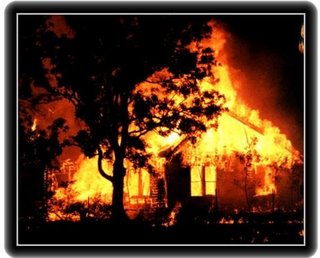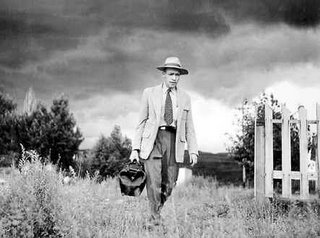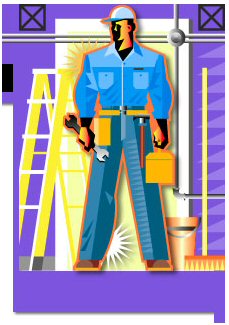
I think that, in our day and age, no one person can possess all of the subsets of skills necessary to thrive--or even survive--in modernity. We need and rely on each other to specialize in certain areas of life. For instance, I'm a doctor. If while you are reading this, you develop a cardiac arrest and drop dead on the floor--which, if sheer boredom can kill, is conceivable--and if I happened to be in your close proximity, lucky for you. I possess the training, skills, and experience necessary to resuscitate you. (Of course, I would need a defibrillator, a bag-mask, an IV, medications, EKG, nursing help, etc. Keep those handy, too.)
But if, while you are reading this, your washing machine goes kaput, your computer becomes irrevocably infested with spyware, or your gas-line starts to leak, then having me in your close proximity is no advantage.
All three of these things happened to us in the past week, and we suffered immeasurably because of them, weeping in despair at our complete incompetence in dealing with these dilemmas. And we would have persisted in our state of pathetic debilitation, if not for the kindly expertise and service of Don and Ron.
First, Don is an employee of Walt's Appliance and (conveniently) Computer Repair. One call, and within a few days he was at our house. It took him fifteen minutes to expertly diagnose our washing machine (slow leak, rusted "wig-wag", old belt, and pump failure--hey, this thing is 20+ years old). Then, within minutes, he had diagnosed our computer virus that has crippled us for weeks, though he needed to take the computer with him to access the appropriate virus-cleaning tools. Now today, our washing machine is operational, our computer is free and clear, and a semblance of order has returned to our interdependent existence, all for the low price of $213.00.
Next, Ron is an exceptionally good-natured employee of Atmos Energy, our local gas company. When Elizabeth and I both smelt a sudden, strong gas odor in our home at 10:30 pm on Wednesday night, we got the kids in the car, pulled out into the street, called the gas company, and watched our home explode into flames. Just kidding, no explosion. But Atmos promptly dispatched the on-call technician to our home, Ron. He arrived within fifteen minutes, calmly and cheerily proceeded to identify that there was no gas leak, but that our pilot light had gone out on our hot-water heater. A small amount of gas had probably escaped into the air, was drawn upstairs quickly by our attic fan, but was now all gone. He lit our pilot light, then proceeded to track down the entire length of our gas line, including underground, to ensure that there was no problem. He then pronounced our house safe for our return, and as we slinked back in, he called after us to let us know he'd be back in a jiffy if there were any more problems. No charge. We slept well that night.
Just kidding, no explosion. But Atmos promptly dispatched the on-call technician to our home, Ron. He arrived within fifteen minutes, calmly and cheerily proceeded to identify that there was no gas leak, but that our pilot light had gone out on our hot-water heater. A small amount of gas had probably escaped into the air, was drawn upstairs quickly by our attic fan, but was now all gone. He lit our pilot light, then proceeded to track down the entire length of our gas line, including underground, to ensure that there was no problem. He then pronounced our house safe for our return, and as we slinked back in, he called after us to let us know he'd be back in a jiffy if there were any more problems. No charge. We slept well that night.
So whether it be the above problems, auto work, legal needs, medical care, or any other of the hundreds of necessary survival skills for today's world, we all have two options. The first would be to go to school or otherwise educate ourselves, and then fix the problem on our own. The only catch with this plan is that it would be time-consuming, cumbersome, and impossible. It would take more than our entire lifespans to acquire the necessary experience just to make the rest of our lives livable. Therefore, the second option is the only realistic one: we must trust our fellow humans and rely on each others' experience and expertise to get us out of a jam.
Modern medicine is a microcosm of our greater society out there, in the sense that it has become highly sub-specialized. I am currently working with a dermatologist, whose twenty-plus years of experience allow him to instantly diagnose most skin conditions, the same conditions that I, as a family practitioner, spend thirty minutes reading about, consulting with other doctors, and ultimately scratching my head, saying, "I don't know what the heck is wrong with you, but it's crazy!" (Patients don't respond well to this display of bewilderment.) :)

That being said, I think that there is a greater need than ever for the well-rounded family physician, the one doctor who can take all the different pieces of the puzzle and make them fit into a coherent picture. I would say that I can appropriately and expertly manage about eighty percent of the health problems that patients come to me with. The other twenty percent? I'm glad there are specialists out there who can ride to the rescue. But ask the dermatologist to manage hypertension or a child's ear infection, and he would probably give you the same look of bewilderment I give when looking at a complicated skin problem.
So in the end, it's all about trust and interdependence. Thanks to all those from whose expertise I have benefitted in my life. I need you, you need me, look how happy we can be. (Is this starting to sound like Barney?)


5 comments:
We all get by with a little help from our friends.
I.M.H.O., it is kind of ironic that even in the United States (home of the famous "rugged individualism"), we are so completely inter-dependent on the knowledge and services of others for our quality of life. Ironic, but as Mark wrote also totally inescapable, and perhaps not such a bad thing, all idle fantasies of Mountain Family Robinson lifestyles aside. Besides, I can only imagine that a steady diet of jerky, poisonous berries and giardia-tainted stream water would get pretty old in a very short time.
(Thanks btw for dropping the MFR reference, Mark -- a 70's Family Flick touchstone, the memory of which brought warmth to my sneering post-modernist black heart *snicker*)
I suppose it is this reliance on others / community which is a fundamental condition of social skills, laws, education and other such institutions that help us all play nice and not run with scissors -- and with the added benefit of specialization (resulting in such lauded professions as physician, engineer, teacher, stay-at-home parent, accountant and digital imaging technician, to name just a few ;-) ).
The fact that we as human beings derive so much personal identity from the type of work that we do also reflects upon this consideration. The role each of us assumes within our communities gives relative worth (and dare I say it, a certain amount of (*ahem*) status) to ourselves, our families, our associates. There are some obvious flaws in this system, of course (such as an automotive neophyte such as myself being ripped off by Bob the evil mechanic) but there are also means to circumvent them (such as the BBB, picketing or character assassination via one's blog).
Now, everyone -- play nice, no cheating, and there will be juice and cookies after. ;-D
What you've said is so true, and I often think about what a huge blessing it is that thank everyone is born with different interests and skills. That includes those of us that are driven to make music and promote other cultural arts. After all, when the doctors, farmers, and mechanics of the world have taken care of our practical needs, it's kind of nice to have a little beauty around the edges, no?
Also, I really like your visual aids. Keep the posts coming--they're great!
What the heck are you talking about?
Dad
Post a Comment